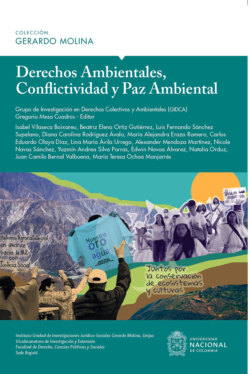Читать книгу Derechos Ambientales, conflictividad y paz ambiental - Gregorio Mesa Cuadros - Страница 10
На сайте Литреса книга снята с продажи.
CAPÍTULO 1 SOME DEBATES IN ENVIRONMENTAL CONFLICT AND ENVIRONMENTAL RIGHTS IN LATIN AMERICA AND COLOMBIA*
ОглавлениеGREGORIO MESA CUADROS**
There cannot be a clearer demonstration of anything, than several nations of the Americans are of this, who are rich in land, and poor in all the comforts of life; whom nature having furnished as liberally as any other people, with the materials of plenty, i.e. a fruitful soil, apt to produce in abundance, what might serve for food, raiment, and delight; yet for want of improving it by labour, have not one hundredth part of the conveniences we enjoy: and a king of a large and fruitful territory there, feeds, lodges, and is clad worse than a day-labourer in England.
JOHN LOCKE, The Second Treatise of Civil Government
The question before us is whether the class of persons [Negro people or slaves] described in the plea in abatement compose a portion of this people, and are constituent members of this sovereignty? We think they are not, and that they are not included, and were not intended to be included, under the word “citizens” in the Constitution, and can therefore claim none of the rights and privileges which that instrument provides for and secures to citizens of the United States. On the contrary, they were at that time considered as a subordinate and inferior class of beings who had been subjugated by the dominant race, and, whether emancipated or not, yet remained subject to their authority, and had no rights or privileges but such as those who held the power and the Government might choose to grant them.
SUPREME COURT OF THE UNITED STATES, Dred Scott v. Sandford
The main problems of the contemporary world have to do with the way human beings relate to the environment. This relationship is culturally diverse and depends on how human societies have built concrete and specific relationships with their natural environment and other human communities.
The specific use of nature by cultures is related to the concrete forms of how the law defines whom the environment belongs to or to which it belongs, that is, of legal forms pre-established by law and new ones that human beings, States, corporations or, especially, the academy, prescribe on how the environment can or should be used or appropriated.
Environmental conflict is the concept I use to identify the differences, contradictions and oppositions between various kinds of use and appropriation of nature and is the result of the actions of one, several or many human beings or groups that improperly or unjustifiably appropriate the Nature, which belongs to another, to several, many or all subjects of law.
In the last five centuries, companies and States have been illegally appropriating the Nature from other nations and States, seeking to legitimize this appropriation with new theories of law. The University usually serves these forms of appropriation, either because the theories originate there or because companies and States with power finance studies that say or formulate theories that these companies and those States require to appropriate what is not theirs.
For the above, the right of appropriation corresponds to theories of liberal rights, which have in civil and political rights the central axis in the idea of freedom over property and unlimited appropriation of nature. Even in contemporary times, social, economic, cultural, collective and environmental rights are considered mere aspirations that can be accepted in the future since there are multiple theories of rights, the radical is imposed despite the rivers of ink that go in favor of other alternative theories.
To present this theory, I have grouped this text into two parts. The first is a brief analysis of environmental conflict from the political and legal point of view and the second, the basis of a theory of environmental rights, which discusses theories of rights that contributes to the resolution of the environmental conflict, the search and concretion of environmental justice, especially in the Latin American and Colombian sphere.
